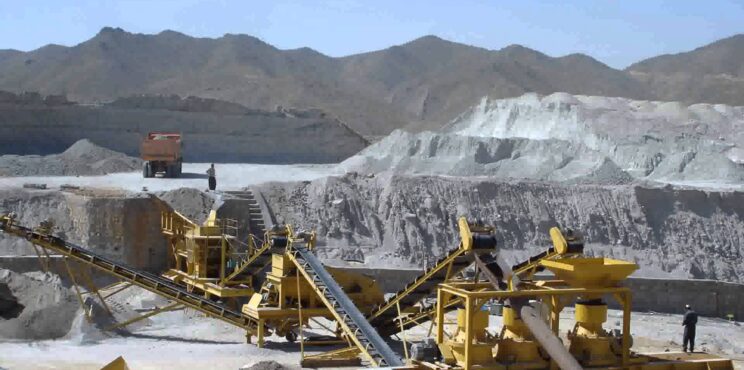Stabilising mining to thrive

The mining sector has been and continues to be a catalyst for the country’s economic development, generating more foreign exchange and a leading source of export earnings.
For several decades, the sector has contributed immensely to contributing to Foreign Direct Investment (FDI), shoring up government revenue and job creation.
The sector is a major economic force propelling several industries in the country such as logistics and transport, real estate and hotel, petroleum, banking and finance, agriculture, education and health.
The industry revolves around gold, bauxite, manganese, diamond, sand winning, and quarrying, with gold dominating the sector.
It is estimated that gold accounted for 93.28 per cent of gross mineral revenue, while the respective share of manganese, bauxite, and diamond were for 6.17 per cent, 0.54 per cent and 0.01 per cent.
The mining industry is said to be capital intensive and requires huge capital investment to negotiate for a mining concession and operate a mine.
Perhaps, that may account for the domination of the sector by multinationals and foreign companies, which have the financial wherewithal to finance the huge capital outlay to acquire a mining concession and operate a mine.
When, the sector was liberalized in the early 1990s after the Structural Adjustment Programme, which abolished restrictions foreign exchange transactions and imports, the sector has attracted several multinationals and received huge FDI into the sector, which has enabled the players in the sector to acquire ailing state gold mines and acquire new concessions.
Local companies and investors appear to shy away from the sector because of the risky nature of the sector and the huge capital requirement to open a mine. For, instance, exploration alone costs several millions of dollars and if nothing is found, the huge investment has gone to waste.
Ghana after the liberalization of its mining sector, continues to attract mining giants and FDI’s in the sector.
Currently, the sector is dominated by mining giants such as Newmont, AngloGold Ashanti, Gold Fields, Golden Star Resources, Asanko Gold, which are investing hugely and exploring to discover more mineral resources.
The presence of these multinational companies in the mining communities have helped to build the local economies through employment and investment socio-economic activities such as education and health.
The attraction of the mining giants into the country can be largely attributed to the country’s favourable fiscal regime and policies, relative and political stability, democratic maturity as well as the country’s huge mineral endowment.
According to the GCM, Ghana maintained its position as the leading producer of Gold in Africa and the eight largest producer in the world in 2019.
That the mining sector has been one of the levers through which the country’s economy rest, cannot be an exaggeration.
The GCM 2019 Mining Industry Statistics and Data said information from the Ghana Revenue Authority (GRA) shows that total direct domestic fiscal receipts attributable to the mining and quarrying sector improved from GHC2.36 billion in 2018 to GHc4.02 billion in 2019, representing a seventeen per cent increase and influenced by increases in production and price,
“In view the significant growth in fiscal payments, the share of the mining and quarrying sector in the total direct domestic receipt mobilised by the GRA improved from 14.2 per cent in 2018 to 18.3 per cent. The sector’s total fiscal contribution in 2019 was the second highest after the financial and insurance and translates into 7.7 per cent of domestic revenue, said the report.
In 2018, the report said the mining and quarrying sector was the largest contributor to direct domestic receipt and accounted for five per cent of domestic fiscal revenue and in terms of total government revenue, the mining and quarrying sectors contribution increase from 4.9 per cent in 2018 to 7.6 per cent in 2019.
“Data from the Bank of Ghana, indicates that proceeds from the export of minerals rose from $6.678 billion in 2019 from $5,760 billion in 2018. The sixteen per cent expansion in mineral revenue was occasioned by improvement in receipts from gold, manganese, and bauxite, which outweighed the decline in proceeds from the exports of diamond,’ the report said.
It indicated that the “outturn in mineral receipts expanded the sector’s share in gross merchandise export receipts from 39 per cent in 2018 to 43 per cent in 2019, consolidating its status as foremost source of foreign exchange from export earnings and compares favourably with the outturns of 29 per cent and 15 per cent of crude oil and cocoa respectively in 2019.”
In respect of repatriation of mineral export receipts, the report explained that the producing member companies of the GCM returned $3.3 billion out of their realized mineral export revenue of $4.5 billion in 2019.
It said the entire $3.3 billion, which translates into 73 per cent of export receipt of the producing member companies, was ploughed back into the country through the various commercial banks, to deepen their intermediation function as well as reinforce their foreign exchange reserves to meet the import demands of the country.
Furthermore, on capital investment, the GCM said producing mining companies made capital expenditure of $544.22 million on plant, machinery and equipment in 2019 as compared to $720.7564 million in 2018 and that accounted for 12 per cent of total mineral revenue in 2019.
On employment, in 2019, the workforce engaged directly by the producing member companies of the chamber was 11, 899 as compared to 10,109 in 2018.
From the issues raised above, the mining sector cannot be ignored in the government’s quest to develop the country.
Particularly, if the country works hard to double its 2019 mining tax revenue in the subsequent years and attract more FDI’s into the sector, it would create more fiscal space for the country.
Also, the raising of more tax revenue and attraction of more FDI’s would help boost the country’s revenue and reduce government’s borrowing to fund national development projects.
With regards to employment, though the mining sector is described as an “enclave businesses,” and did not benefit a lot of people like agriculture, the sector’s employment of more than 11,000 Ghanaian’s cannot be discounted.
What would have been the fate of the more than 11,000 workers and their dependents, if the mining sector has not employed them? It is the envy and pride of many Ghanaians to work for a mining company because of the better working conditions prevailing in the mining companies.
However, the view generally held by some Ghanaians is that, the country has not benefited from the mining sector. According to them, the mining communities in the country are pale shadows of themselves. Unlike Johannesburg in South Africa, which has been developed through mining, same cannot be said about Obuasi in Ghana, they argue.
But, if government cannot not strike better mining deals and did not use mining proceeds to develop the communities the communities, can the mining companies be blamed? Likewise, if our chiefs and community leaders squander mining royalties to the chagrin of their community members, can the mining companies be blamed for that?
Although, the Ghana is viewed by investors as a safe investment and mining hub in the West African sub-region and Africa as a whole, the country should work hard to further improve on its mining laws and fiscal regime to attract more investment into the mining sector. Stability in mining agreements, fiscal and legal regimes policies will prove the trick in attracting more investment to the sector.
Changing the country’s fiscal regime and mining policies at whim to the disadvantage of mining companies would send a bad signal to the mining investment community and cast a slur on the economy and curtail mining investment to the country.
The life of span of a mining concession take a long as fifteen to thirty years and changing the fiscal and policy regime at will can affect investors in the sector and make the lose their investments
Policy makers in the mining sector in the country needs to be bear in mind that the country is competing with other favourable mining jurisdictions such as Cote D’Ivoire, Mali and other West Africa and Africa as well as the global world for mining investment.
Now that the fiscal space is narrowing for the Ghana, in view of the growing public debt, attracting mining more investment into the country would go a long way to boost government revenue and raise more resources to fund development projects.
Therefore, it is hoped that the Minister of Lands and Natural Resources, Abu Jinapor would send signals to mining investors that the country is ripe and the best destination for mining in the world.














